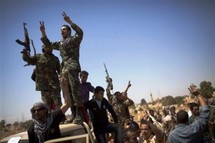Kadhafi forces counter-attack as rebels cut his oil
Deborah Pasmantier
GUALISH, Deborah Pasmantier- Forces loyal to Moamer Kadhafi launched a counter-attack on Sunday against rebel advance positions southwest of Tripoli, an AFP correspondent said, as rebels cut off an oil pipeline used to supply the Libyan strongman's forces.
Loyalist troops fired half a dozen Grad rockets into the hamlet of Gualish 50 kilometres (30 miles) from the capital, and the rebels replied with anti-tank fire as they sought to hold a key gateway to Tripoli they seized on Wednesday.

In its daily update, the Western military alliance said its planes carried out 48 strike sorties on Saturday, with the focus on the port of Misrata.
The rebels on Sunday cut off an oil pipeline they said was used to supply Kadhafi's forces in the west. Around 20 rebels shut off the valves of the pipeline to Zuwarah refinery near Khamassa.
"The oil belongs to all Libyans, not Kadhafi. He will no longer be able to use it against us," one rebel was heard telling loyalist forces by telephone.
Meanwhile, rebel troops advancing into the loyalist stronghold of Zliten said Sunday they lost one fighter and had 32 wounded by landmines laid by Kadhafi's retreating troops.
Insurgents pressing out westward from the long-besieged city of Misrata said the ordnance was laid by Kadhafi loyalists falling back from their positions around Zliten.
Zliten, once considered a bastion of Kadhafi forces, is a key link on the road from rebel-held Misrata to Tripoli.
Libyan rebels said they were preparing on Saturday to push forward in their drive on Tripoli from both the south and west in a bid to isolate Kadhafi in his ever-closer capital.
But the embattled leader remained defiant, telling supporters on Friday that "the regime in Libya will not fall."
After heavy fighting, rebel fighters captured Gualish on Wednesday, taking them closer to the strategic garrison town Gharyan and the last major objective standing between them and Tripoli to the north.
For now, they have set their sights on Asablah, on the road to Gharyan.
A second target in a three-pronged strategy is the coastal city of Zawiyah, one of the last major loyalist strongholds west of Tripoli.
And from a base in Misrata, 215 kilometres east of the capital, the rebels reported on Friday battling to within two kilometres of the centre of Zliten town with the loss of five dead and 17 wounded.
"When we take Zliten, enforced with Misrata, it gives us a clear path" to Tripoli, rebel spokesman Colonel Ahmed Omar Bani said.
On the political front, a Libyan opposition Islamist, Sheikh Ali Sallabi, said he had been mediating with Kadhafi's regime to try to end the conflict.
"For three months, I have been negotiating with the regime with the knowledge of the National Transitional Council (TNC), most recently two weeks ago in Cairo," the Qatar-based cleric told AFP.
Australia on Sunday vowed to keep up humanitarian aid to Libya, as a senior official from Canberra visited the rebels' eastern stronghold on Benghazi for the first time since the revolt erupted.
"Australia... has been a very significant supporter, in a humanitarian sense, of the Libyan people to this point," Paul Grigson, Australia's deputy foreign affairs and trade secretary, said after meeting NTC members, pledging to carry that on.
France vowed to work with the African Union to find "political solutions" to the Libya crisis, but insisted that Kadhafi's ouster was a "key point."
"We agreed that we must now find a political outcome to the situation in Libya and this solution implies a genuine ceasefire and also an inclusive national dialogue between all the parties," French Foreign Minister Alain Juppe said.
"The key point is the withdrawal of Kadhafi from power, from his military and civilian responsibilities and we agreed to work all together to reach this goal," he told reporters in Addis Ababa of this month's African Union summit in Malabo.
Meanwhile, the NTC issued a blunt warning to neighbouring Algeria, insisting that it must "stop supporting Kadhafi."
Vice president Abdel Hafiz Ghoga accused Algeria of supporting Kadhafi militarily in the early days of the war, and continuing to support him politically.
-------------------------------------------------------------------------------------